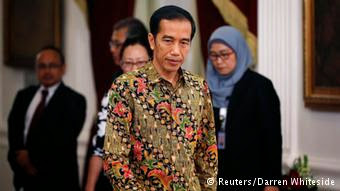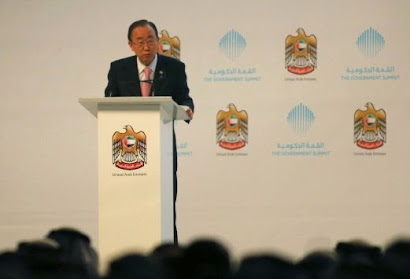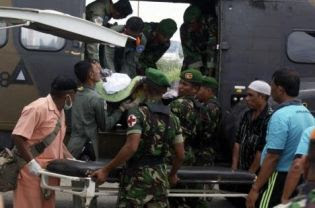Jakarta Globe, Grace Susetyo, February 28, 2013
 |
| Scenes from a Kamoro drum-making ceremony in Jakarta, using blood and limestone as an adhesive and a piece of lizard skin as a membrane. (JG Photo/Grace Susetyo). |
Related
articles
It was a
hot and sunny late morning when I stepped out of the car to hear a manly chorus
calling to the vigorous rhythms of bloodied lizard-skin drums. The singing men
were standing in rows inside dozens of afloat canoes, dressed in brown skirts
made of sago fiber.
Meanwhile,
on land, craftsmen put finishing touches to their artwork for auctioneers to
fight over. The artwork included ewe (drums), mbitoro (spirit poles), mbikao
(ghost suits), arrows and stylized animal figures that looked like they came
out of a prehistoric fairy tale.
The roads
leading there were rocky and dusty, but this festive atmosphere made the trip
worthwhile.
I don’t
remember the remote village’s name, nor have I been there recently. Actually
these are rather faded childhood memories from the late 1990s when I lived in
Mimika, the homeland of Papua’s Kamoro tribe.
“We haven’t
had a big festival in the last couple of years,” said Kal Muller, an
anthropologist who has been living among the Kamoro for nearly two decades. He
explained funding and logistics have both been problems.
So when I
had the recent opportunity to attend a Kamoro drum-making ceremony in Jakarta,
I felt fortunate to witness this fading ritual. After performing a welcome
dance lifting songs of praise to the ancestors, six men gathered to show the
beautifully carved ironwood drum-shell and the piece of lizard-skin to be used
as the membrane.
Herman
Kiripi, aged 35, had his arm tied and finely cut with a new razor blade.
Droplets of his blood were contained in a pair of seashells and mixed with
crushed limestone to make an adhesive. Human blood is an important ingredient
for the drum to the Kamoro as it serves as a device to communicate with their
ancestors.
“The drum
could only sound right with blood,” Herman said .
“I can’t
tell the difference,” quipped Muller, a 74-year-old Hungarian-American who has
given his own blood many times for drums like this.
After
smearing the adhesive around the drum-shell’s rim, four men pulled the
lizard-skin taut, securing it with string. Finally, the finished drum was
beaten and the audience applauded enthusiastically.
In recent
years, the Kamoro have gained increasing attention for their traditional
carving and exotic cultural experiences to quench the adventure traveler’s
curiosity. As the ancient culture struggles to survive against the pressures of
globalization, well-meaning urbanites try to help by buying their artwork and
applauding their shows, packaged in entertaining events and tourist
itineraries.
But we
sometimes forget that behind what we perceive as this gratifying parade of
exoticism, lies the sacred collective memories of the Kamoro ancestors and
motherland. Muller is one of few people in the world who has had the privilege
and dedication to document this culture, using his books, photography and
films. Nevertheless, much of the Kamoro’s stories remain unheard of in
Indonesia, let alone abroad .
Ancestral
worship is a strong foundation of Kamoro culture.
“We are
Catholic Christians, so we attend church on Sunday and pray to Jesus Christ and
Mother Mary. We venerate them the similar way that we venerate our ancestors,”
said Silfinus Mametapo, a village elder from Hiripau. “But then we go back into
the workshop, and we sing Kamoro language songs to praise our ancestors. We
pray for wisdom and inspiration and our ancestors’ presence comes upon us as we
carve.”
The Kamoro
believe that they are descendants of Mapuru, a poor man from Pigapu village.
Legend says that the patriarch was caught by a dragon-serpent while out hunting.
After some bargaining, the serpent agreed to let Mapuru go on the condition
that he refrain from eating a certain type of fish. However, out of poverty and
desperation, Mapuru broke his promise and ate the forbidden fish. After that
Mapuru disappeared without a trace.
Some Kamoro
claim that three days later Mapuru miraculously found himself on top of the
Maoke mountains. He spread crushed limestone as he walked around and turned the
mountains into copper and gold. “The Kamoro recognized copper and gold ores
from antiquity,” Mametapo said. “But before Freeport [mining company] came, we
did not know how to process them or what their value was.”
Memories of
Mapuru make a common theme in Kamoro carvings, music and rituals. The site
where he is believed to have disappeared in East Mimika is now marked with a
monument to Mapuru, depicting an old man and his two dogs.
Before
Dutch and Moluccan missionaries came to evangelize, the Kamoro was a
matrilineal society, with women playing an important role in its culture.
Two
important Kamoro matriarchs are Aweya and Miminareya. Legend has it that the
sisters and their husbands went for a long fishing trip in the mangroves. They
did not have enough time to make it home because Miminareya was heavily
pregnant and exhausted, so they anchored their boat midway for the night.
That night,
Miminareya died during childbirth and gave her son Miminareyau to Aweya. Aweya
then laid Miminareyau to sleep beside her own son Aweyau and overnight they
grew into adult men. Aweyau and Miminareyau taught the Kamoro archery,
weaponry, nose piercing rituals and other traditional knowledge.
But Aweyau
and Miminareyau were not men of morals and often terrorized the villagers, who
in revenge plotted to kill the cousins. In defense, Aweyau and Miminareyau
weaved zombie suits from plant fibers to scare the villagers and rob them. They
named the suits mbikao , literally meaning skin of deceased spirits. As the
cousins shed their mbikaos the villagers caught up with them and killed them by
the Tipuka River Today, the Kamoro still perform mbikao dances in honor of the
patriarchs.
Ancestries
determine whether a Kamoro man becomes a sculptor or a boatmaker. When a Kamoro
sculptor boy reaches adolescence, he is initiated in a karapau ceremony. The
karapau , a special house constructed for this purpose, is built away from the
villages and boys undergo a secret initiation. In the karapau, boys are
introduced to the sculptures and carve their first mbitoro pole for the spirits
of the dead. At the end of the karapau, sago fiber skirts are draped on the
boys, a sign of officially entering manhood. The men then head back to the
village for a mbitoro erecting ceremony and a celebration of dance and music.
Likewise,
boatmaker clans have an initiation ceremony called the kaware . After boatmaker
boys don their grass skirts, they release canoes to a nearby body of water and
perform musical rowing races.
The rituals
of the Kamoro are struggling to survive, according to Muller, the researcher.
Decades ago, the Kamoro lived off the land as hunter-gatherers, but today
Kamoro children are attending Indonesian schools and the youth are adopting
modern lifestyles that require money. Many young adults prefer to work in
mining or other growing industries in Mimika, rather than continue their
ancestors’ sacred vocations as hunters and carvers.
Muller said
he hoped to help preserve the tribe’s traditions by finding markets for Kamoro
carvings and promoting eco-tourism in their homeland. With funding from the
local mine, Muller’s team mentors young educated Kamoro to carry on as
guardians of the tradition, equipped with strategies that make the role profitable
for the local community in the 21st century.
When asked
about the impact of modernization on the Kamoro, Muller said: “It’s like the
saying, beauty is in the eye of the beholder. It’s up to you to decide whether
the positive is stronger or the negative is stronger.”
















.jpg)

